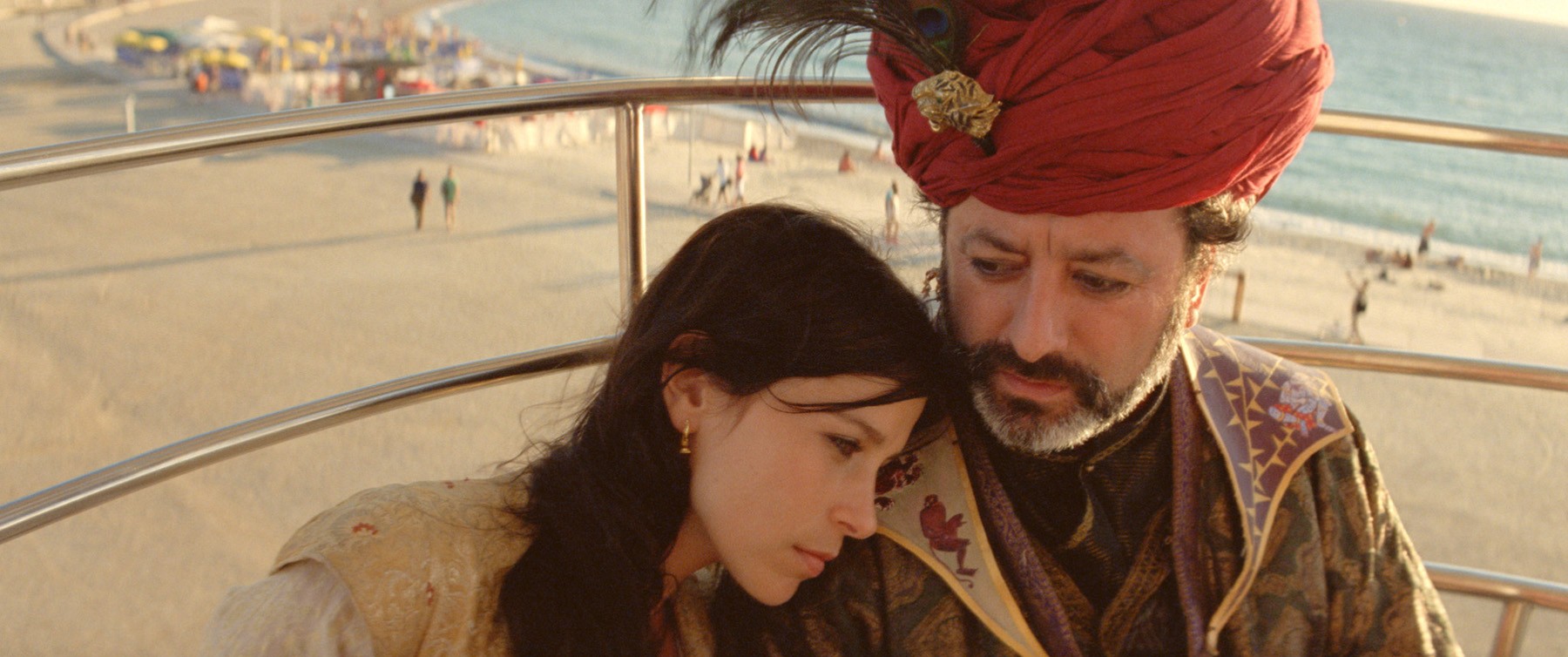
If you've kept abreast of international cinema this year you'll have no doubt heard much about Arabian Nights: The three-part, 381-minute Portuguese epic by Miguel Gomes has been the toast of the festival circuit since its premiere at Directors' Fortnight in Cannes this May. And yet despite the ecstatic reception, its future was far from clear. The six-and-a-half-hour sprawl of this thing might do for the indefatigable cinephile, peering at the screen over a cup of tepid coffee in the throes of a ten-day arthouse gantlet. But a theatrical release? One could hardly be assured.
Well, here it is. Arabian Nights arrives at last this month courtesy of Kino Lorber, which has taken the three-volume structure to its logical extreme and released each as a standalone film. Festival programmers could never quite agree on an ideal approach to scheduling this picture, or on whether its three parts constitute a single picture at all; in the Czech Republic I saw it over three consecutive afternoons, while at the Toronto International Film Festival it screened in its entirety with only hour-long intermissions. Gomes himself hasn't expressed an opinion one way or another. However you enjoy its nearly four hundred minutes, I expect you'll be held rapt till the last second by a film of abundant wit and generous heart.
Though it may not seem that way from the beginning. Volume 1, dubbed The Restless One, is demanding from the fore, taking its time to reward patience with pleasure. Its first twenty minutes in particular can be trying if you suspect that their obscurity and languor are a glimpse of the hundred still to come. They find Gomes himself onscreen, moping in self-professed anguish: He wants to make another movie, he explains, but the austerity measures that have beleaguered Portugal loom too large, eclipsing more frivolous subjects. But how do you make a film that addresses, with nuance and urgency, a national economic crisis? Gomes admits that he doesn't know. Instead he absconds, running from the set like a maniac as his camera crew hastily follows.

From then on, between musings on the filmmaking process and his unbudging creative paralysis, Gomes offers snatches of films that were never meant to be: Footage from an unfinished documentary about a countryside wasp plague is set against interviews with workers laid off from the Viana do Castelo shipyards, a parallel Gomes, in voiceover, insists is meaningful—even if he can't be sure how or why.
But this first act's conclusion proves productive. It establishes, for him and for us, the need for storytelling of a more conventional sort: Captured at last by his camera crew and, naturally enough, sentenced to death for having abandoned them, Gomes endeavors to absolve himself by his only available means—spinning yarns so compelling that it will quell the urge to kill him. And so the movie begins. We are introduced to the immortal Scheherazade (Crista Alfaiate), gliding along sun-dappled water in a modern-day motorboat, as pop music blares and the opening titles crawl in a sequence of invigorating bliss. Scheherazade, as in the folk tales, is both character and framing device, doomed to tell stories for a thousand and one nights in order to postpone her execution at the hands of her husband the king. These stories become the episodic narrative of the rest of the film.
Gomes distances himself from the obligations of such monumental source material. He includes a title card to the point: “This film is not an adaptation of ARABIAN NIGHTS despite drawing on its structure,” and, indeed, the stories themselves have been conceived with ingenuity and singular verve. The first is “The Men With Hard-Ons”; its lively, ingratiating manner will seem a kind of olive branch to anyone impatient with those stage-setting early scenes. This uproarious satirical short concerns a group of European political emissaries descending on Portugal with economy-crippling demands—and whose ruthlessness on the world stage turns out to be a manifestation of their impotence in bed. It's as though Gomes, angry but hoping to be fair-minded, opted to begin with his nastiest barbs before moving on.
“The Story of the Cockerel and the Fire” is next, a bargain as two tales in one. In the first a small-town judge must decide whether to sentence to beheading a local woman's obstreperous rooster, accused of keeping the neighbors up with crowing at all hours; called upon to defend himself, the rooster—who of course can communicate with the judge telepathically—narrates the story of his plea, in which a lovesick young girl sets forest fires every night in a bid for the affection of her beau. (The rooster claims his all-night crowing was a failed attempt to warn others of the blazes; he is acquitted for his efforts.) The same stretch also finds time for the exploits of an ancient Chinese emperor and a group of overworked volunteer firefighters. It can be dizzying just to keep up.
The stories have an almost dreamlike sweep and imaginative energy, and the film never exhausts that exuberance. More extraordinary still is its emotional depth. A simple exchange by text message toward the end of “The Cockerel and the Fire” reduced me to tears with its understated pathos—and that's in a story told by a talking chicken.
Volume 2 is even richer on this front. “The Tears of the Judge,” a long, elaborate sequence that details an unconventional trial at which every attending onlooker proves culpable in the crime, is especially stirring and strange, proceeding with a nightmare logic and, in contrast to the vigor of the first episode, a pleasingly somnambulant mood.
Arabian Nights reaches a crest of sorts with “The Owners of Dixie,” the last of Volume 2's three long stories—and a whopping punch to the gut. Its subjects are death, poverty, and decay in an unglamorous apartment complex hit hard by austerity—and in its cross-section view of the indignities bequeathed by the government to the poor, it's justly despairing. In a report for Mubi from Arabian Nights' Cannes premiere, critic Danny Kasman called this “the lightest” of the trilogy's many episodes—and, counterintuitive though that might seem, he is correct: The story's prevailing register is a kind of tenacious, enduring joy, the misery of life be damned. I credit Dixie himself for that spirit: This shaggy Maltese poodle, the luckless hero of the episode, finds himself passed from one owner to another as each proves incapable of taking care of him. Still Dixie loves, and hopes, and tries his best to give joy. And in that yapping indefatigability Gomes locates the very soul of his devastated nation.
Scheherazade herself opens the final volume, The Enchanted One. Consigned forever to the bedroom of the king, our storyteller reflects on the people she'll never meet and the stories she'll never hear: divers, treasure hunters, lovers with paramours all across the world. Of course, Gomes recognizes here the limitations of his project, which even at thirty times the length could never voice definitively the needs of the people he wishes to represent. This concession may account for this volume's relative placidity. Its central story, the eighty-minute “Inebriated Chorus of the Chaffinches,” seems in its reserved style to deliberately undermine expectations of a grand finale, drawing Gomes's gargantuan Arabian Nights to a close with an appropriately nontraditional denouement.
This is a film about the necessity of storytelling, but it is also one about its inherent frustrations—and frustration is what many will feel, even, or perhaps especially, after this much time invested. (I saw a handful of those who'd made it through more than six hours of the film walk unceremoniously out with only twenty minutes left to go.) Arabian Nights is an attempt to reckon with a crisis that is quite beyond it; any sense of resolution, in the conventional sense, would have been a betrayal of the truth. This is a masterpiece not because it culminates in some redemptive catharsis or clinching argument for social change, but because, by disavowing such facile ends, it meets the mess of life on its own clear and true terms.
Arabian Nights was directed by Miguel Gomes; written by Telmo Churro, Miguel Gomes and Mariana Ricardo; and stars Miguel Gomes, Carloto Cotta, Adriano Luz and Rogério Samora.

